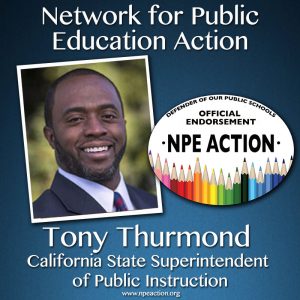DeVos on ballot - enrique baloyra
Despite not appearing on any ballot this November, Betsy DeVos sure is having a big impact this election cycle. Her corporate agenda has long been the object of scorn among activists. But now as secretary, her name has become a rallying cry for progressive candidates everywhere.
In Texas, Democratic nominee for US Senate Beto O’Rourke is running an ad that calls Ted Cruz “the deciding vote on putting Betsy DeVos in charge of our children’s public education.”
In Alaska, education advocate Alyse Galvin, who gained notoriety for pressuring Senator Lisa Murkowski to vote no in the secretary’s confirmation hearing, is running for the seat Rep. Don Young has held for 44 years.
If Democrats want to regain control of Congress on November 6, they’ll have to win big in Midwestern states where the president won just two years ago. And that’s exactly where DeVos is least popular.
In Ohio, Wisconsin, Illinois, Minnesota, and especially her home state Michigan, Democratic candidates are hammering their Republican opponents for supporting DeVos and her policies.
In Michigan, where DeVos and her family have spent $14 million supporting Republican candidates this year alone, Democratic nominee for governor Gretchen Whitman promises “to stop the dismantling of public education and put an end to the DeVos agenda…” https://twitter.com/gretchenwhitmer/s...
“[DeVos’] political legacy has had disastrous consequences for Michigan children. After decades of unlimited charter growth — dominated by for-profit charters — the state ranks dead last in the nation in growth of academic achievement as measured by standardized test scores and is in the bottom 10 states in key measures of academic achievement.” https://www.salon.com/2018/10/20/educ...
DeVos made it priority number one to gut civil rights protections for children with disabilities and LGBT students. Her attempts to roll back Title IX protections for sexual assault victims come as the #MeToo movement has gained national momentum. Her support for allowing schools to arm teachers using federal money has drawn a Freedom of Information Act lawsuit. Last week a judge ordered her to stop blocking Obama-era student loans protections.
And to top it off, her security detail cost taxpayers $14 million this year. For an education secretary.
Disney couldn’t have created a better villainess.
In Texas, Democratic nominee for US Senate Beto O’Rourke is running an ad that calls Ted Cruz “the deciding vote on putting Betsy DeVos in charge of our children’s public education.”
In Alaska, education advocate Alyse Galvin, who gained notoriety for pressuring Senator Lisa Murkowski to vote no in the secretary’s confirmation hearing, is running for the seat Rep. Don Young has held for 44 years.
If Democrats want to regain control of Congress on November 6, they’ll have to win big in Midwestern states where the president won just two years ago. And that’s exactly where DeVos is least popular.
In Ohio, Wisconsin, Illinois, Minnesota, and especially her home state Michigan, Democratic candidates are hammering their Republican opponents for supporting DeVos and her policies.
In Michigan, where DeVos and her family have spent $14 million supporting Republican candidates this year alone, Democratic nominee for governor Gretchen Whitman promises “to stop the dismantling of public education and put an end to the DeVos agenda…” https://twitter.com/gretchenwhitmer/s...
“[DeVos’] political legacy has had disastrous consequences for Michigan children. After decades of unlimited charter growth — dominated by for-profit charters — the state ranks dead last in the nation in growth of academic achievement as measured by standardized test scores and is in the bottom 10 states in key measures of academic achievement.” https://www.salon.com/2018/10/20/educ...
DeVos made it priority number one to gut civil rights protections for children with disabilities and LGBT students. Her attempts to roll back Title IX protections for sexual assault victims come as the #MeToo movement has gained national momentum. Her support for allowing schools to arm teachers using federal money has drawn a Freedom of Information Act lawsuit. Last week a judge ordered her to stop blocking Obama-era student loans protections.
And to top it off, her security detail cost taxpayers $14 million this year. For an education secretary.
Disney couldn’t have created a better villainess.
DeVos on ballot - YouTube - https://www.youtube.com/watch?v=37EAbVBqRkE&feature=push-u-sub&attr_tag=zqKfc6PF4gT3xhqD%3A6















